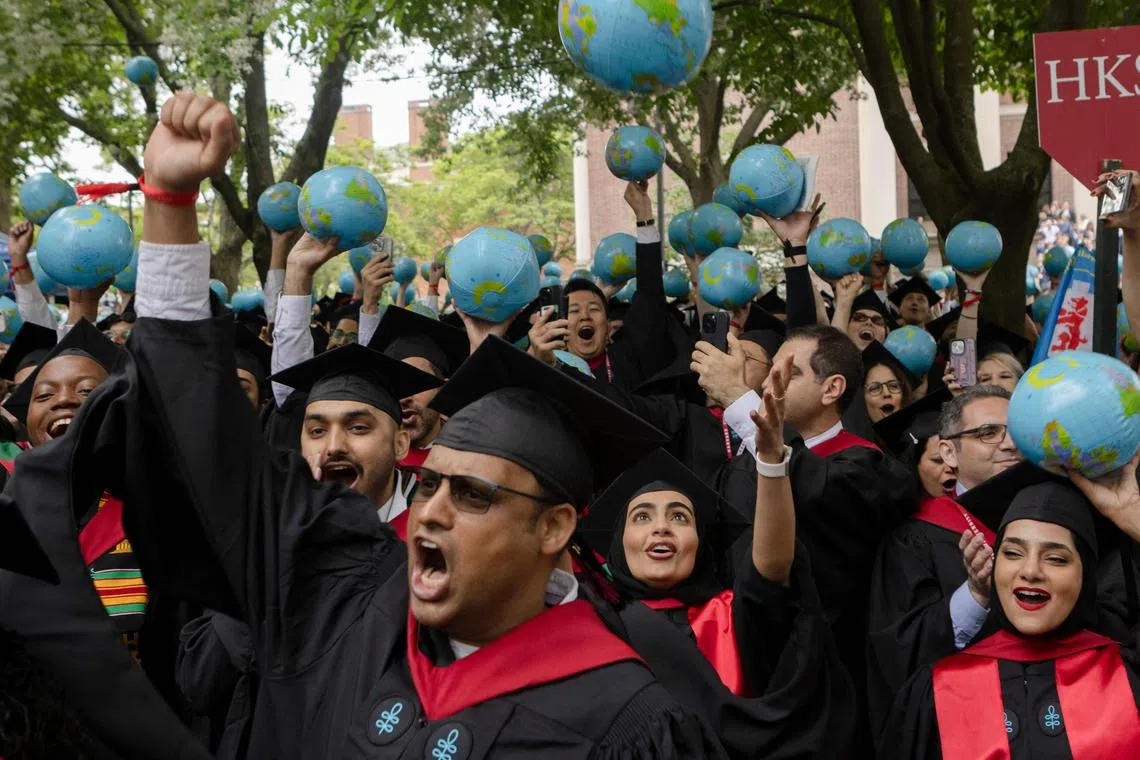Trump’s bid to bar foreign students from Harvard threatens Kennedy School’s lifeblood
Sign up now: Get ST's newsletters delivered to your inbox

Graduates from Harvard University’s John F. Kennedy School of Government celebrating their commencement ceremony on May 29.
PHOTO: AFP
Follow topic:
CAMBRIDGE, Massachusetts - When 35-year-old Oscar Escobar completed his term as the youngest elected mayor in his Colombian home town in 2023, he was accepted into a programme at Harvard University’s John F. Kennedy School of Government tailored to aspiring global leaders like him.
If the Trump administration gets its way, Mr Escobar may be among the last foreign students for the foreseeable future to attend the Kennedy School, widely considered one of the world’s best schools for preparing future policymakers.
In May, the Department of Homeland Security sought to revoke Harvard’s ability to enrol international students
It accused the university of “fostering violence, anti-Semitism and coordinating with the Chinese Communist Party”.
In early June, President Donald Trump doubled down by issuing a proclamation to bar US entry for foreign nationals planning to study at Harvard and directed the State Department to consider revoking visas for those already enrolled.
Mr Trump argued that Harvard has tolerated crime on campus and that its relationships with China threatened national security.
Harvard said the orders – which affect thousands of students – were illegal and amounted to retaliation for rejecting the government’s demands to control its governance and curriculum, among other things.
It added that it was addressing concerns about anti-Semitism and campus threats.
A federal judge has temporarily blocked both orders while the courts review legal challenges, but if allowed to stand, they would represent a huge blow to Harvard, and the Kennedy School in particular.
Over the past five years, 52 per cent of Kennedy students have come from outside the US, the school’s media office said. With students from more than 100 countries, it is “the most global” school at Harvard.
White House spokeswoman Abigail Jackson said in a response to a Reuters request that the proclamation “is carefully tailored towards limiting the risks foreign students at Harvard may pose to national security and campus safety”.
The Department of Homeland Security did not respond to questions for this story and referred Reuters to its previous statements.
A spokesperson for the State Department declined to respond to questions about Harvard and the Kennedy School, saying it did not comment on pending litigation.
The large foreign contingent is a big part of why the school has been so successful as a training ground for future leaders, including Americans, said Professor Nicholas Burns, a Kennedy School professor and a former US diplomat.
“It’s by design,” Professor Burns said in an interview, referring to the number of international students. “It’s a decision that the Kennedy School leadership made because it replicates the world as it is.”
Kennedy counts an impressive list of foreign leaders among its alumni, including former Mexican president Felipe Calderon and former Canadian prime minister Pierre Trudeau.
Another is Ms Maia Sandu, who was elected president of Moldova in 2020 after she graduated.
She has since emerged as an important regional voice against Russian influence, spearheading the country’s drive to join the European Union and taking a stand against Russia’s invasion of Ukraine.
“At Harvard, I met interesting people from all over the world, every one with his or her own story,” Ms Sandu said in a 2022 address to Kennedy School graduates.
“And, very quickly, I realised that my country was not the only one which had been struggling for decades. I realised that development takes time.”
‘Soft power’
For the school’s defenders, foreign students bring more benefits than risks. They say educating future world leaders means boosting US “soft power”, a concept coined in the 1980s by Harvard political scientist Joseph Nye, later a Kennedy School dean, to refer to non-coercive ways to promote US values such as democracy and human rights.
Singapore Prime Minister Lawrence Wong, a Kennedy School graduate who must now navigate the rivalry between the US and China in South-east Asia, has acknowledged the influence of American culture
He says he decided to study in the US in part because his favourite musicians were Americans. In 2024, Mr Wong posted a TikTok video of himself playing Taylor Swift’s Love Song
To be sure, the Kennedy School has courted its share of controversies – including criticism over who it accepts into its programmes and who it invites to teach and speak to its students.
A notable example came in 2022 when Kennedy’s Carr Centre for Human Rights Policy offered a fellowship to Mr Kenneth Roth, former executive director of Human Rights Watch (HRW), and then rescinded it.
Mr Roth said at the time he believed the school caved to pressure from supporters of Israel who believed HRW had an anti-Israel bias.
Kennedy denied that, but eventually reversed course amid widespread criticism that it was limiting debate.
For Mr Escobar, smiling as he posed for graduation photos with his family in May, completing his studies at Kennedy was a bittersweet moment.
“If this university cannot receive international students any more, of course, we are missing an opportunity,” said Mr Escobar, who has since returned to Colombia to work on the presidential campaign of leftist politician Claudia Lopez, also a former Harvard fellow.
“If what President Donald Trump wants is to make America great again, it will be a mistake.” REUTERS

